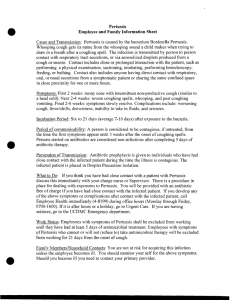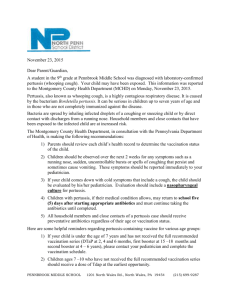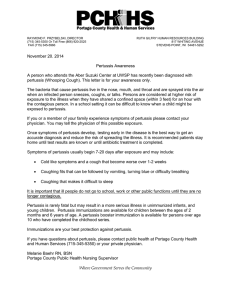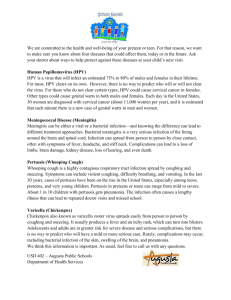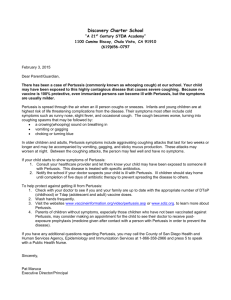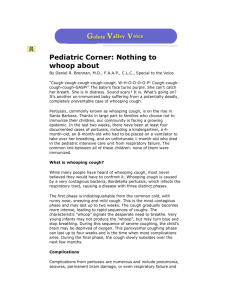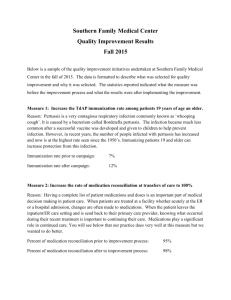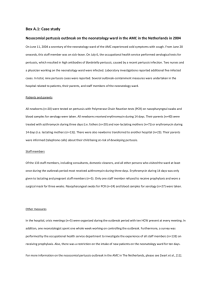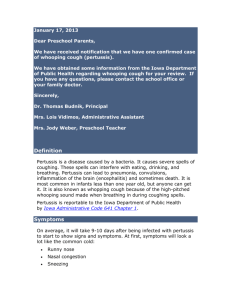Huntley Community School District 158
advertisement
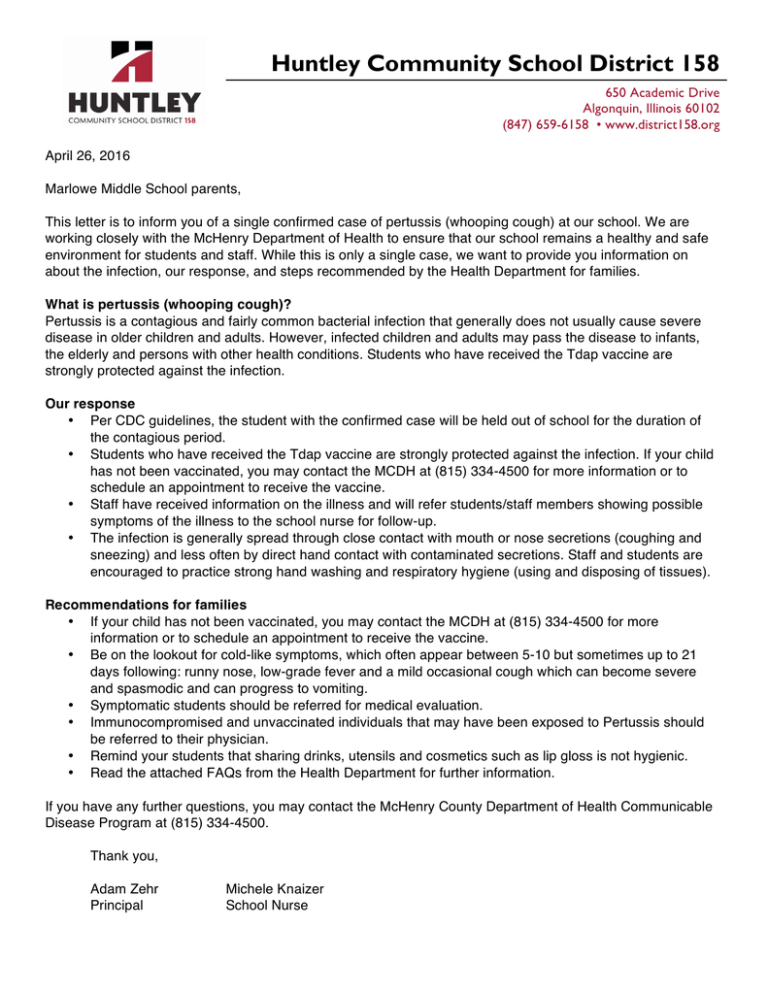
Huntley Community School District 158 650 Academic Drive Algonquin, Illinois 60102 (847) 659-6158 • www.district158.org April 26, 2016 Marlowe Middle School parents, This letter is to inform you of a single confirmed case of pertussis (whooping cough) at our school. We are working closely with the McHenry Department of Health to ensure that our school remains a healthy and safe environment for students and staff. While this is only a single case, we want to provide you information on about the infection, our response, and steps recommended by the Health Department for families. What is pertussis (whooping cough)? Pertussis is a contagious and fairly common bacterial infection that generally does not usually cause severe disease in older children and adults. However, infected children and adults may pass the disease to infants, the elderly and persons with other health conditions. Students who have received the Tdap vaccine are strongly protected against the infection. Our response • Per CDC guidelines, the student with the confirmed case will be held out of school for the duration of the contagious period. • Students who have received the Tdap vaccine are strongly protected against the infection. If your child has not been vaccinated, you may contact the MCDH at (815) 334-4500 for more information or to schedule an appointment to receive the vaccine. • Staff have received information on the illness and will refer students/staff members showing possible symptoms of the illness to the school nurse for follow-up. • The infection is generally spread through close contact with mouth or nose secretions (coughing and sneezing) and less often by direct hand contact with contaminated secretions. Staff and students are encouraged to practice strong hand washing and respiratory hygiene (using and disposing of tissues). Recommendations for families • If your child has not been vaccinated, you may contact the MCDH at (815) 334-4500 for more information or to schedule an appointment to receive the vaccine. • Be on the lookout for cold-like symptoms, which often appear between 5-10 but sometimes up to 21 days following: runny nose, low-grade fever and a mild occasional cough which can become severe and spasmodic and can progress to vomiting. • Symptomatic students should be referred for medical evaluation. • Immunocompromised and unvaccinated individuals that may have been exposed to Pertussis should be referred to their physician. • Remind your students that sharing drinks, utensils and cosmetics such as lip gloss is not hygienic. • Read the attached FAQs from the Health Department for further information. If you have any further questions, you may contact the McHenry County Department of Health Communicable Disease Program at (815) 334-4500. Thank you, Adam Zehr Principal Michele Knaizer School Nurse Pertussis FAQ What is pertussis (whooping cough)? Pertussis is a contagious and fairly common bacterial infection that causes a range of illnesses, from mild cough to severe disease. Pertussis does not usually cause severe disease in older children and adults. However, infected children and adults may pass the disease to infants, the elderly and persons with other health conditions. Pertussis disease within these vulnerable populations can have very serious consequences. What are the signs or symptoms of pertussis? Pertussis begins with cold-like signs or symptoms including a runny-nose, sneezing, low-grade fever, and mild cough. Symptoms will progress to severe, long bouts or coughing, which may cause vomiting, loss of breath, difficulty catching breath and/or cyanosis (ie, blueness). The characteristic “whoop” sound may be heard when inhaling after a period of coughing. Fever is usually absent. What are the incubation and contagious periods for pertussis? Persons infected with pertussis will begin to develop symptoms usually within 7 to 10 days of exposure. Persons with pertussis are contagious from the beginning of symptoms until 2 weeks after the cough begins. An infant who has no pertussis immunization may remain infectious for 6 weeks or more after the cough starts. How is pertussis spread? Pertussis is spread through close contact with mouth or nose secretions and possibly by direct hand contact with contaminated secretions. Because pertussis is a highly communicable disease, persons with pertussis may be excluded from school, work and other group settings until they receive appropriate evaluation and treatment. How is pertussis treated? Pertussis is easily treated with antibiotics. Antibiotics should also be taken by household and other close contacts of the person with pertussis. How is pertussis prevented? Pertussis is a vaccine-preventable disease. However, protection is incomplete and decreases over time after routine childhood immunization. Adolescent pertussis boosters as well as booster shots for adults have been approved for use in person’s age 10 years of age or older. Talk to your child’s healthcare provider to determine if a booster vaccination is appropriate for your child. If your child needs the Tdap booster and you do not have insurance or your insurance does not cover vaccinations, contact the McHenry County Department of Health at (815) 334-4500 for an Immunization Clinic appointment. Tdap Vaccinations are also available at many of the local pharmacy clinics. In addition, frequent handwashing and respiratory hygiene (e.g. covering your cough, coughing into tissues, disposing of tissues promptly) are important practices that help to limit the spread of infection. Be alert for symptoms of pertussis described above and contact your health provider if the symptoms appear. Should you have any questions, please contact the McHenry County Department Health Communicable Disease Program at (815) 334-4500.
